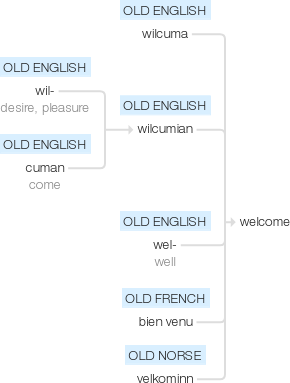Welcome
Old English wilcuma ‘a person whose coming is pleasing’, wilcumian (verb), from wil- ‘desire, pleasure’ + cuman ‘come’. The first element was later changed to wel- ‘well’, influenced by Old French bien venu or Old Norse velkominn .
wiktionary
From Middle English welcome, wolcume, wulcume, wilcume, from Old English wilcuma(“a wished-for guest”; compare also wilcume(“welcome!”, interjection)), from Proto-Germanic *wiljakumô(“a comer, a wished-for guest”), equivalent to will(“desire”) + come(“comer, arrival”). The component wil- was replaced by wel- when the sense “guest” of the second component was no longer understood, possibly under the influence of French bienvenu. Cognate with Scots walcome, West Frisian wolkom, Dutch welkom (earlier willecome), German willkommen, German Low German willkamen, Danish velkommen, Norwegian Bokmål velkommen, Norwegian Nynorsk velkomen, velkommen, Swedish välkommen, Icelandic velkomin, Faroese vælkomin.
Similar constructions are common in Romance languages, such as Italian benvenuto, Spanish bienvenido, French bienvenu, Catalan benvingut, Portuguese bem-vindo and Romanian bun venit, each meaning “[may you have fared] well [in] coming [here]”. These do not derive from Classic Latin, where a similar construction is not found, and presumably are instead the result of a calque from, considering the ruling elite of the barbarian kingdoms which succeeded the Western Roman Empire, a Germanic language to Proto-Romance (Vulgar Latin; see Latin *bene venūtus, and compare *perdono for similar historical phenomenon).
etymonline
welcome (n.)
Old English wilcuma "welcome!" exclamation of kindly greeting, from earlier wilcuma (n.) "welcome guest," literally "one whose coming suits another's will or wish," from willa "pleasure, desire, choice" (see will (n.)) + cuma "guest," related to cuman "to come," from PIE root *gwa- "to go, come." Similar formation in Old High German willicomo, Middle Dutch wellecome.
Meaning "entertainment or public reception as a greeting" is recorded from 1530. The adjective is from Old English wilcuma. You're welcome as a formulaic response to thank you is attested from 1907. Welcome mat is from 1908; welcome wagon is attested from 1940.
welcome (v.)
Old English wilcumian "to welcome, greet gladly," from wilcuma (see welcome (n.)). Related: Welcomed; welcoming.
